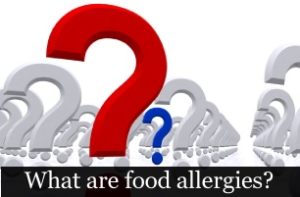What are food allergies?

In simple terms a food allergy is an immune system response to a food, medicine, insect sting, bite, chemical, environmental pollen or other foreign substance that enters the body. The response that happens is unpredictable. It may be mild or severe. The reaction may occur through contact (skin, eyes, nose, cut or other mucous membrane), inhalation, or ingestion.
Consider allergies as ever changing since you can grow out of an allergy, become allergic to another food, medicine, or environmental factor without notice, and symptoms can change for the better or worse after each exposure.
What are the symptoms of food allergies?
Some of the symptoms that can occur may be but are not limited to:
- Abdominal pain
- Swelling (face, tongue, hands, feet, etc)
- Diarrhea
- Wheezing
- Difficulty breathing
- Vomiting
- Hives (may vary in size)
- Itching
- Loss of consciousness
- Redness of skin
- Stomach ache
Are food allergies and food intolerances the same?
There is often confusion on the difference between food allergies and food intolerances. Some of the same symptoms can occur with both, but they are substantially different. Food intolerance involves the digestive system while a food allergy involves the immune system. Food allergies can be life threatening, while food intolerances normally are not. Often people with food intolerances can tolerate small amounts of specific foods, while people with true food allergies can react to even the most minuscule amounts of the allergen, so strict avoidance is advised.
Some common food allergies are milk allergy, peanut allergy, tree nut allergy, wheat allergy, egg allergy, soy allergy, fish allergy, and shellfish allergy. Some less common allergies are fava bean allergy, sesame seed allergy, corn allergy, beef allergy, rice allergy, kiwi allergy, mango allergy, sulfite allergy, casein allergy, oral allergy syndrome and sunflower seed allergy.
If you suspect you have food allergies, see your doctor or allergist for testing and diagnosis. Knowing what foods to avoid and carrying emergency medicine like epinephrine, if needed, can save your life if you have a serious allergy.
- What are the most common food allergies?
- Food allergy and food intolerance?
- Are food allergies increasing?
- What is anaphylaxis?
- Learn about food allergen labeling
Category: Food
